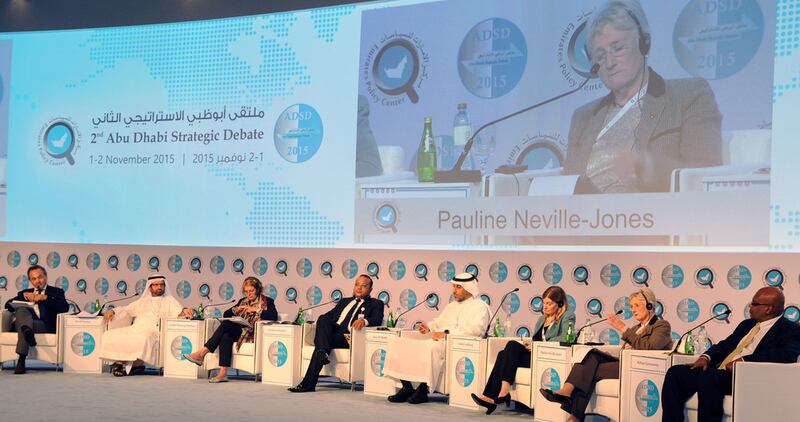ABU DHABI // Regional countries are faced with a new type of terrorism and violent extremism, which require a new approach, experts said at the Strategic Debate on Monday.
They said a response must include military, humanitarian and ideological facets.
"There is a new type of jihadism which was not imported but it is of people born in the same country, like in France with the Charlie Hebdo incident earlier this year," said Gilles Kepel, political scientist and professor at Sciences Po in France.
“This poses a totally new dimension in the threat of terrorism. Previously, there was no real territory and nothing like an ISIL, but now we have one so we have those two new phenomenons.”
Eleven people were killed when gunmen stormed the Paris offices of the French satirical magazine Charlie Hebdo in January. The gunmen were French nationals of North African origin.
“This is a new wave of jihadism,” Mr Kepel said. “We have moved from a pyramidal terrorist organisation to a network-based organisation.
“Nowadays, security agencies are at a loss to a large extent, because they fight an enemy that they do not really understand. It is something that cannot be detected in advance and is tough to deal with.”
Terrorism has become a global issue, with a third of jihadists in countries such as Syria found to be converts of Islam.
“Based on the recent instability in the Middle East, the world as a whole will pay the price,” said Dr Ali Al Noaimi, vice chancellor of the UAE University. “ISIL has created a new system in terrorism and there is no place in the world immune from their acts.”
Dr Al Noaimi said the root causes of terrorism and violent extremism needed to be tackled.
“I recognise we have in our cultural roots in our region the justification for the making of violent extremism and terrorism,” he said. “All political, religious and educational elites need to tackle this issue. We cannot just be confined to security bodies because this is beyond their capacity. It is a societal responsibility.”
Others called on a renewed collective focus to end conflicts through diplomatic means.
“There is a particular virulency in the wars raging in Syria, Yemen and Iraq,” said Nancy Lindborg, president of the US Institute of Peace.
“But we need to move away from the idea of countering and look more at how to create a positive alternative. If you go back to the sense that many are attracted to extremism because there is not any other better way forward, that will be an important part of the solution.”
The centre linked up with Abu Dhabi on a series of peace games where it role-played around some of these issues.
“We found that as you look at the role of security forces you have to do it counter to what you think,” Ms Lindborg said.
“You cannot wait until you are responding to terrorism but do it because that is how you build a more effective and legitimate state.”
Ultimately, a single shared strategy is needed.
“This is not a quick-fix solution,” said Pauline Neville-Jones, Conservative member of the UK House of Lords and former minister for security and counter-terrorism.
“While I think it is serious in Europe, I think it is existential in terms of the threat it poses to the countries that have been identified in this dialogue, including the Gulf. It is a matter that concerns us all and it is not just governments, it is also social and civil society.
“You also have to deal with the underlying social ills that breed some of the extremism as well as the humanitarian aspect.
“It is not going to be dealt with overnight or very simply. It is a serious ideological challenge.”
cmalek@thenational.ae






